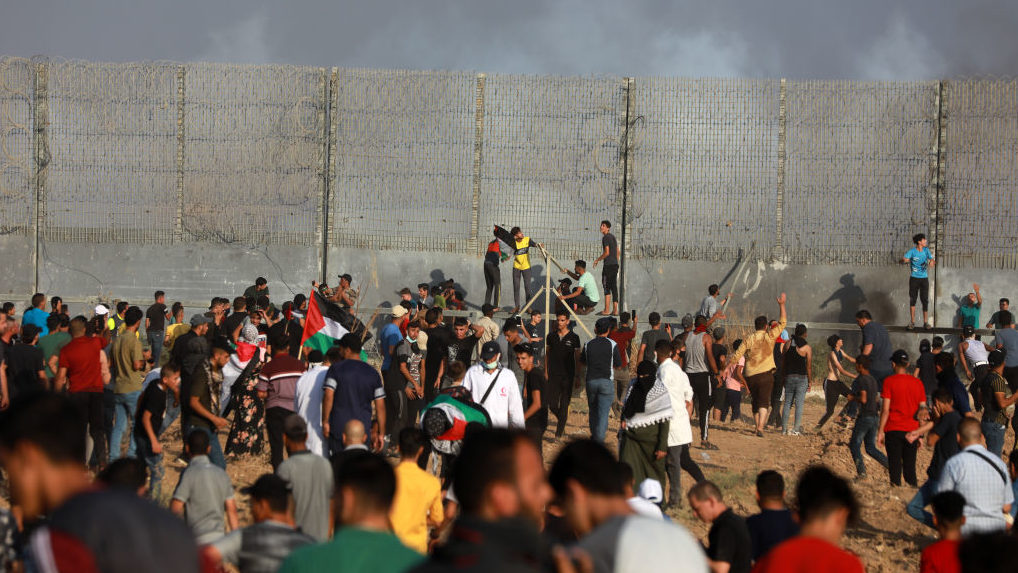Israeli Warplanes Strike Hamas Sites in Gaza After Border Clashes, Threatening Fragile Truce
Gaza analyst says that if Israel does not lift its siege on Gaza and allow more goods to enter then there will be more violence on the border
Israeli warplanes targeted Hamas positions in Gaza Saturday after bloody cross-border clashes between Israeli troops and Palestinian protesters left dozens injured, including an Israel Defense Forces sniper and a 13-year-old Palestinian boy who were both critically wounded.
Three months to the day after the two sides reached a truce that ended an 11-day conflict, tension is still hovering around the threat of renewed violence. Hamas repeatedly has said that if Israel does not lift its blockade on Gaza and allow goods and aid to enter without any restrictions, it will allow the resumption of border activities, such as demonstrations and the launching of incendiary balloons, which already have burned hundreds of acres of forest and farmland.
Yoni Ben-Menachem, senior researcher at the Jerusalem Center for Public Affairs, told The Media Line that Israeli intelligence failed, and dropped the ball on the weekend’s violence.
“Yesterday’s events are an abject and total failure of the Israeli army, especially since this demonstration was known about for several days,” he said.
Ben-Menachem added that “the Israeli army announced that it had increased its readiness, and they placed sniper soldiers on the border, and yet what happened. This is stupidity.”
He called on the Israeli military to target any Palestinian approaching the border fence with live bullets, tweeting: “Instruct IDF soldiers to fire live ammunition at anyone approaching 300 meters from the border fence without asking questions. Bennett, Gantz and Kochavi, wake up!”
He is referring to Israel’s top three military officials: Prime Minister Naftali Bennett, Defense Minister Benny Gantz and Israel Defense Forces Chief of Staff Lt. Gen. Aviv Kochavi.
Ben-Menachem says Israel must retaliate against the Palestinians who shot at the Israeli sniper.
“The identity of this person is known to the Israeli intelligence, and he must be held accountable,” he told The Media Line.
Yesterday’s events are an abject and total failure of the Israeli army, especially since this demonstration was known about for several days
Bennett said Sunday that Israel would retaliate against anyone who attacks Israelis, vowing to “settle the score” with attackers.
Meanwhile, Palestinian factions in Gaza pledged to continue the border activities and escalation until Israel meets their demands.
“We will continue activities without hesitation or retreat until Israel stops harming Jerusalem and our people in the West Bank, and until the siege on the Gaza Strip is lifted,” they said in a statement at a news conference. “Israel must take legal and humanitarian responsibility.”
Dr. Mohammed Mosheer Amer, director of the Centre for Political and Development Studies, and associate professor of Linguistics at the Islamic University of Gaza, told The Media Line that people in Gaza had hoped and expected that the aftermath of the 11-day conflict in May would lead to a major improvement in the lives of people in the impoverished coastal enclave.
“The economic conditions, the health conditions, the overall quality of life in the Gaza Strip, unfortunately, the Israelis to the contrary have tightened the siege and imposed several measures of collective punishment on the Palestinian people. They have denied the entry of most of the needed necessities and aid to people in Gaza,” he said.
Lately, Israel has slightly eased its restriction on goods entering Gaza, allowing some material to cross, but Mosheer Amer says that is not sufficient.
As long as the “crippling siege on the strip” remains, the expectation is that the Palestinian people will not stay “silent,” he says.
“They let in small amounts of goods and aid, but, overall, the health and economic situation is dire here. That’s why we were expecting this point and that there will be an escalation. And, certainly, yesterday was not the tipping point but the beginning of an escalation especially if the broker, the Egyptians, don’t intervene immediately and try to alleviate if not break the siege on the Gaza Strip,” said Mosheer Amer.
Abbas Kamel, director of the Egyptian General Intelligence Directorate, visited Israel and the Palestinian territories last week, meeting with officials on both sides and injecting a sliver of hope that the fragile truce and shaky calm in place since the May flareup will continue.
Israel and Hamas have been engaged in indirect talks under the auspices of the Egyptians, but so far these negotiations have yielded little.
Egypt helped broker a cease-fire that ended the conflict in May between Israel and Hamas.
A Hamas official in Gaza told The Media Line that the deal that was cut last week to transfer Qatari grant money to Gaza is now in jeopardy.
Despite threats by the Israeli prime minister on Sunday, Ben-Menachem accuses Bennett’s government of weakness and failure to act firmly when dealing with the Islamist group that governs Gaza.
“Today, a decision [by the Israeli government] was supposed to issue an order to cancel all understandings relating to the Qatari grant,” he said.
Ben-Menachem argues that Bennett wants calm so his meeting with US President Joe Biden this week in Washington is not disrupted.
“We are heading toward escalation, especially since there is still a dispute over the Qatari grant, reconstruction and other matters,” he said.
Mosheer Amer says if the international community, including the Americans and the Egyptians, “don’t exercise enough pressure on the Israeli occupation to improve the living situation on the ground for the people in Gaza, we’re headed in the direction of a major escalation because people will not remain silent in the face of slow death.”
“Life is becoming unbearable for people in the Gaza Strip,” he warned.


